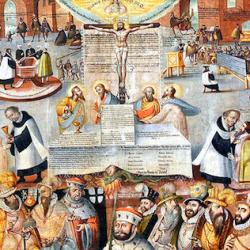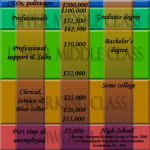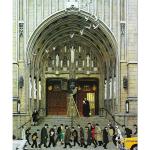Owen Cummings’s brief study of “the Eucharist across the ages and traditions” (Eucharist & Ecumenism) holds many surprises.
There are some standard well-known texts – the Didache, Justin’s description of the Eucharistic service, The Apostolic Tradition of Hippolytus. But then Cummings collection goes rogue. He includes a Eucharistic prayer from the eastern church, that of Addai and Mari, a brief analysis of the Eucharistic theologies of Baldwin of Ford and Margery Kempe. Better-known names also appear – Richard Hooker and Lancelot Andrewes – but when was the last time they were included in a study of the Eucharist? Cummings includes a chapter on the Eucharistic revivals and fairs of the American frontier, and ends with a chapter on Monsignor Quixote’s Eucharist.
His selections give his book the feel of a Eucharistic underground. Of Baldwin of Ford, Cummings quotes a scholar who says that he is “one of the last true representations of a rich monastic theological tradition which was soon to be followed [I suspect this should be “swallowed” – PJL] up in the inexorable advance of philosophical scholasticism” (52). The chapter on Margery Kempe puts the Eucharistic in a richly mystical setting. In the sermons of Lancelot Andrewes, he finds splendid passages like this: “There we do not gather to Christ or of Christ, but we gather Christ himself; and gathering him we shall gather the tree and fruit and all upon it. For as there is a recapitulation of all in heaven and earth in Christ, so there is a recapitulation of all in Christ in the holy sacrament” (87).
The frontier revivalists are a surprise. James McGready insists that “God is as really present at the sacramental table as he was in the burning bush at Horeb, or on Mount Sinai, or as he will be at the judgment of the great day. . . . here you may behold all the perfections of God shining with amiable brightness in the face of Jesus Christ” (106). No anemic memorialist here.
For all the interest of Cummings’s book, there is something disquieting about it. The Eucharist is, as Andrewes says, a recapitulation of all in Christ. But not all Eucharistic theologies or practices are equal. The frontier fairs occurred once (or a few times) a year, and that has to nurture a different sort of Eucharistic theology and piety than a weekly celebration of the Supper. Both cannot be best practice. Decisions about liturgy should be well-informed by the variety of Christian traditions, but decisions still have to be made.















